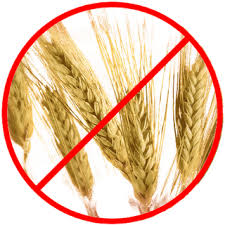
Today Rusty Gregory is a featured guest writer, sharing with us the benefits of eliminating wheat from our diets. For our gluten-free foodie community, we can’t eat wheat so it’s not a choice, but isn’t it great to know there are many benefits to living gluten-free? Enjoy Rusty’s informative article, and learn more about him in his bio below.
~~~~~~~~~~
As a personal trainer I frequently hear, “It’s fine because I only do that in moderation.” It can be hard to refute at times when no immediate consequence is felt. For example, we all know the harmful effects of smoking, but it is possible to smoke one cigarette and not develop cancer, emphysema or COPD. So, does that mean that smoking is okay? Of course not! But, it does give people a false sense of security or in some cases, a way to justify their unhealthy habit.
The concept of moderation is prevalent in our diet because we don’t want to give up unhealthy food that we like; not to mention we love the instant gratification and convenience that certain foods provide us. But, a healthy understanding of what some of these foods contain might make you think twice before grabbing even just one of the next easy, feel-good foods.
One thing that most of these foods have in common is wheat … it’s hidden in the most unexpected places! It can be found in many foods from pasta to cereal to meat loaf to salad dressings, many of which could be considered both convenient and “healthy” in some circles. However, approaching the food you eat in a health conscious way is essential to making the correct choices. Here are some ideas to help motivate you to steer clear of wheat when planning your next meal:
1. Eliminates Intestinal Problems. Say good-bye to gas, stomach pain, cramping and bloating which are the most common symptoms experienced with eating wheat. Often times, people attribute their discomfort to other food sources instead of the “healthy” whole grains they are eating.
2. Weight Loss. Wheat-containing foods have blood sugar and insulin spiking effects that lead to weight gain. This occurs when insulin carries glucose (blood sugar) to fat cells to be stored for later use.
3. Decreases the Chance of Developing an Auto-Immune Disease. Wheat contains gluten, a protein. Gluten is made up of gliadin and glutenin. Gliadin causes the up-regulation of zonulin in the small intestine which opens the tight junctions and lets its contents flow out of the small intestine and into your bloodstream. Your immune system then, launches an attack on these “foreign” substances and an auto-immune disease results.
4. Blood Sugar Control. When you rid your diet of wheat, as well as all grains, you significantly reduce the amount of blood-sugar-raising-carbohydrates that help keep you from becoming insulin resistant. This is the step that precedes becoming a type 2 diabetic.
5. Greater Sense of Well-being. A renewed energy level and a more positive outlook on life are just a couple of changes you will experience living the wheat-free life. Anytime you make a healthy lifestyle change your body, mind and soul will thank you.
When removing wheat from your diet you must become an avid ingredient list reader. It can be a little tedious at times, but well worth it.
Rusty Gregory is a personal fitness trainer and wellness coach in Austin, Texas. He is the author of Living Wheat-Free For Dummies and Self-Care Reform: How to Discover Your Own Path to Good Health
. After earning his masters degree in kinesiology from the University of Michigan, he began his personal fitness training and coaching business. He is a Certified Strength and Conditioning Specialist, Certified Cancer Exercise Specialist, and Wellness Coach. Rusty regularly serves as a Contributing Expert for dailyRx.com. To learn more, visit www.RustyGregory.com and Rusty Gregory Facebook Page.
